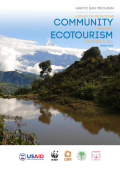This paper presents the major tourism management issues in Xishuangbanna Prefecture, with a particular focus on Xishuangbanna Biosphere Reserve (XBR). It emphasizes the integration of social, economic, and environmental goals for effective tourism planning and development.
The situation analysis was patterned after the principles of the 7Es Environmental Management model for nature-based tourism management—Environment, Economics, Enforcement, Experience, Engagement, Enquiry, and Education.
The authors provide the following recommendations for sustainable tourism planning and management for XBR:
- As a globally recognized protected area, XBR can be managed in accordance with UNESCO’s guidelines. This will be helpful in fostering sustainable tourism and biodiversity conservation.
- Sustainable tourism management should include both the economic feasibility of specific proposed tourism developmental projects, as well as long-term sustainability. The economic imperative to sustain tourism at XBR should not, therefore, compromise the ecological and cultural integrity of the area.
- Involving relevant stakeholders in a collective manner is essential in economic and ecological sustainability of the reserve, including key government departments and their corresponding units at the operational level. An interactive and flexible management approach fosters good relationships with the ethnic groups and better stewardship of the reserve.
- Both capital and human resource investments in tourism development need to be enhanced. The value of indigenous knowledge should not be underestimated in this.
- Institutional support to strengthen community participation, benefit-sharing and capacity-building should also include budgetary and policy interventions, particularly in the early stages of project development.
- Research on the relationships between tourism and the natural and cultural heritage will help inform decision-makers in protected area management and in developing mechanisms that can enhance quality interactions between tourists and nature.
- Proper management of nature reserves requires adequate knowledge of ecological and environmental sciences. The impacts of tourism have to be assessed on a regular basis so that adaptive measures can be developed to promote biodiversity conservation and enhance healthy tourism experiences.


